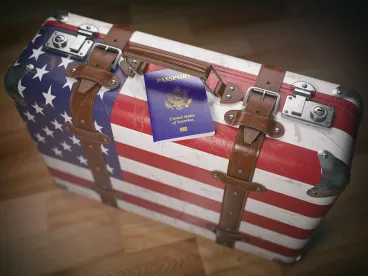The proclamation limits visa issuance and entry into the United States by nationals of eight countries: Chad, Iran, Libya, North Korea, Somalia, Syria, Venezuela, and Yemen.
On September 25, US President Donald Trump announced in a presidential proclamation (the “Proclamation”) a series of enhanced national security measures that suspend travel to the United States by foreign nationals from a list of eight countries whose identity-management and information-sharing practices were found to be deficient under the provisions of Executive Order (EO) 13780.
This prior EO, signed on March 6, 2017, suspended entry into the United States by foreign nationals of six countries pending review of their information-sharing practices and issuance of a mandated report by the secretary of the US Department of Homeland Security (DHS) establishing baseline requirements for (1) information sharing about identity management, (2) information sharing about national security and public safety, and (3) national security and public safety risk factors.
The Proclamation drops Sudan from the original group of six but adds three new countries: Chad, North Korea, and Venezuela. This reflects the US government’s findings that these eight countries do not meet the minimum traveler vetting and information-sharing requirements. The report also found Iraq to be inadequate under the baseline criteria, but entry restrictions were determined not to be warranted due to the close diplomatic ties between the United States and Iraq. However, nationals of Iraq who seek to enter the United States may be subject to additional scrutiny.
Country-Specific Restrictions
The country-specific visa and entry restrictions imposed by the Proclamation are the following:
-
Chad—Entry into the United States by nationals of Chad seeking initial admission as immigrants[1] or as nonimmigrants on business (B-1), tourist (B-2), or business/tourist (B-1/B-2) visas is suspended.
-
Iran—Entry into the United States by nationals of Iran seeking initial admission as immigrants or nonimmigrants is suspended, except that entry by nationals of Iran under valid student (F and M) and exchange visitor (J) visas is not suspended (although such individuals will be subject to enhanced screening and vetting requirements).
-
Libya—Entry into the United States by nationals of Libya seeking initial admission as immigrants or as nonimmigrants on business (B-1), tourist (B-2), or business/tourist (B-1/B-2) visas is suspended.
-
North Korea—Entry into the United States by nationals of North Korea seeking initial admission as immigrants or nonimmigrants is suspended.
-
Somalia—Entry into the United States by nationals of Somalia seeking initial admission as immigrants is suspended, and nonimmigrants traveling to the United States will be subject to enhanced screening and vetting requirements.
-
Syria—Entry into the United States by nationals of Syria seeking initial admission as immigrants or nonimmigrants is suspended.
-
Venezuela—Entry into the United States by certain Venezuelan government officials and their immediate family members seeking admission as nonimmigrants on business (B-1), tourist (B-2), or business/tourist (B-1/B-2) visas is suspended.
-
Yemen—Entry into the United States by nationals of Yemen seeking initial admission as immigrants or as nonimmigrants on business (B-1), tourist (B-2), or business/tourist (B-1/B-2) visas is suspended.
Exceptions
The Proclamation notes that, subject to certain exceptions shown below, the suspensions of and limitations on entry shall apply only to foreign nationals of the designated countries who (1) are outside of the United States on the applicable effective date, (2) do not have a valid visa on the applicable effective date, and (3) do not qualify for a visa or other valid travel document. DHS has confirmed that the Proclamation is expressly limited to individuals who do not have a valid visa on the effective date of the Proclamation.
Notwithstanding the travel limitations described above, the suspension of entry pursuant to the Proclamation will not apply to the following:
-
US permanent residents
-
Foreign nationals admitted to or paroled into the United States on or after the effective date of the Proclamation
-
Foreign nationals who have a document other than a visa (such as an advance parole document) valid on the effective date of the Proclamation or issued on any date thereafter that permits travel to the United States
-
Dual nationals of a designated country, as long as the individual travels on a passport issued by a non-designated country
-
Foreign nationals traveling on a diplomatic or diplomatic-type visa, North Atlantic Treaty Organization visa, C-2 visa for travel to the United Nations, or G-1, G-2, G-3, or G-4 visa
-
Foreign nationals who have been granted asylum, refugees who have already been admitted to the United States, or individuals who have been granted withholding of removal, advance parole, or protection under the United Nations Convention Against Torture
The Proclamation describes the restrictions imposed upon nationals of the eight affected countries as “conditional” and states that they may be lifted depending upon future cooperation with the US government’s efforts to impose enhanced security practices—such as adopting electronic passports, sharing criminal data, reporting lost/stolen passports, and providing data on known and suspected terrorists.
Effective Dates
The implementation of the Proclamation will follow this two-phase process:
Phase 1
From 3:30 pm EDT on Sunday, September 24, 2017 until 12:01 am EDT on Wednesday, October 18, 2017:
-
Nationals of Iran, Libya, Syria, Yemen, and Somalia will remain under suspension of travel except for those individuals who qualify for the bona fide “close family” or relationship with a United States entity exemptions.
-
Nationals of Sudan are no longer subject to travel restrictions as of 3:30 pm EDT on Sunday, September 24, 2017.
Phase 2
Beginning at 12:01 am EDT on Wednesday, October 18, 2017:
-
Nationals of Chad, Iran, Libya, North Korea, Syria, Venezuela, Yemen, and Somalia will be barred from entering the United States, as described above. The exceptions and waivers listed in the Proclamation are applicable for qualified applicants, but the bona fide relationship exceptions will no longer be applicable.
[1] The prohibition on the entry of “immigrants” applies only to persons holding immigrant visas and seeking to enter the United States with such visas for the first time. It does not apply, as discussed below, to persons holding permanent resident cards.



 />i
/>i

